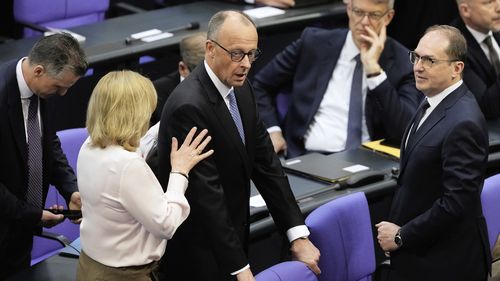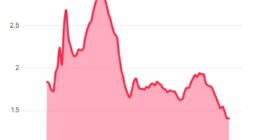Share this @internewscast.com
Lawmakers are scheduled to vote again on Tuesday afternoon (early Wednesday AEST), according to CDU/CSU bloc parliamentary leader Jens Spahn.

But the failed vote was an unforeseen twist that extends a torturous period of political uncertainty for the country.
Only 310 lawmakers voted to approve Merz, just short of the 316 required, starting a two-week countdown to confirm his ascension.
It is the first time in Germany’s post-war history that a chancellor-in-waiting has failed to win a vote.
The AfD pounced on the setback to call for entirely new elections.
“We are ready for government responsibility. And we call for common sense to prevail,” its leader Alice Weidel said.
“Mr Merz should resign immediately. The way should be paved for new elections in our country!”

The federal election in February triggered an extensive period of political maneuvering and negotiation, during which the country’s traditional parties faced challenges from the insurgent far-right AfD party and increasing interference by the Trump administration.
Although Merz’s CDU emerged victorious in the election, it did not secure enough seats to form an independent government â a scenario quite familiar in Germany’s varied political landscape.
He last month announced he would form a coalition with the centre-left Social Democrats (SPD), a rare fusing of Germany’s two establishment groups that ensured the AfD â which came second in the February poll â would remain locked out of power.
It extended the so-called “firewall”, a blockade against far-right groups that German politicians have kept in place since after World War II, but which has become increasingly tenuous.

Germans had expected Tuesday’s parliamentary vote would quell that uncertainty, installing Merz as chancellor and starting a new political era.
But the vote instead revealed deep unhappiness within Merz’s coalition. The two parties hold 328 seats, which suggests that 18 lawmakers defected from the camp.
Merz had hoped to inject some calm into the country with trips to Paris and Warsaw in the coming days; now, he will be forced to whip support for a fresh parliamentary vote, expected later this week.
German lawmakers vote secretly, so it is difficult to pinpoint exactly where support for Merz collapsed. But even if he eventually prevails, the vote ensured Merz will start his chancellorship on the back of a monumental embarrassment.

Merz won a two-thirds parliamentary majority in March to change Germany’s constitutional “debt brake,” a mechanism to limit government borrowing. He intends to give renewed impetus to a 2022 German security policy change dubbed “Zeitenwende” â “a turning point” in English â that was initiated by outgoing Chancellor Olaf Scholz and would see Berlin turbocharge its defense spending in an effort to modernise an ageing military.

German stocks fell further after Merz failed to be elected, although they later recouped some of those losses. The country’s benchmark DAX index was last 1.1 per cent lower on the day.
“The result of today’s vote serves as a reminder of how narrow the majority of the new coalition is, which further dampens hopes for sweeping economic reforms,” Germany’s Commerzbank said in an economic briefing.
And German economist Holger Schmieding described it as “a bad surprise”.
“The unprecedented failure to be elected in the first round would still be a bad start” for Merz, Schmieding said.
“It shows that he cannot fully rely on his two coalition parties.”














